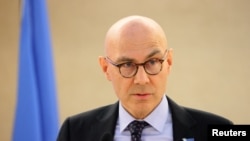"I am profoundly concerned about this strangulation of civil society in several countries," Volker Turk told the United Nations Human Rights Council.
In his opening address to the new session of the council, he voiced particular concern about attacks against people who cooperate with the U.N. and try to sound the alarm about rights abuses in their countries.
Turk did not name specific countries, but did say his concerns included actions by a number of members of the 47-member council.
In his statement to the council Monday, Turk also stressed the need to dramatically ramp up the presence of U.N. rights monitoring around the world.
In particular, he said, he would like to see his staff more present "in humanitarian situations, which almost invariably trigger or greatly exacerbate human rights concerns."
He is calling for the doubling of his office's budget and says he ultimately would like to see branches of his office in every country.
Council-member China is among countries repeatedly accused of intimidation and reprisals by rights groups and non-governmental organizations.
"Attacks on people for their cooperation with the U.N. are a particularly insidious form of non-cooperation, and can have a chilling effect across the civic space," Turk said.
For now, though, he said he thought it was important to "establish a presence for the first time in China and India, two countries which together comprise more than one-third of the world's population."
He also said he would like to "scale up engagement, for example in Brazil, Central Asia, Ecuador, Kenya, Mozambique and the United States, as well as the Caribbean region."
He pointed out that U.N. Secretary-General Antonio Guterres had issued 13 reports in as many years about such intimidation and reprisals, with information about more than 700 cases or incidents in 77 countries.
Last year's report included allegations of acts of intimidation and reprisals by 42 countries, including Russia, China and Belarus.
"Twelve of those states are current members of this council," Turk said.
He warned though that the annual report on reprisals "does not provide a complete picture."
"When intimidation and repression of civil society is so intense that people simply refrain from taking the risk of cooperating with international bodies, we will receive no reports of reprisals, because nobody dares to interact with us."
Council president Vaclav Balek told reporters last week that he had recently dealt with two cases of alleged reprisals, without providing further details.
The four-week council session is due to address a range of crises, including the situations in Afghanistan, Iran and Ukraine, and will touch on rights issues, including gender-based discrimination and artificial intelligence.











Forum